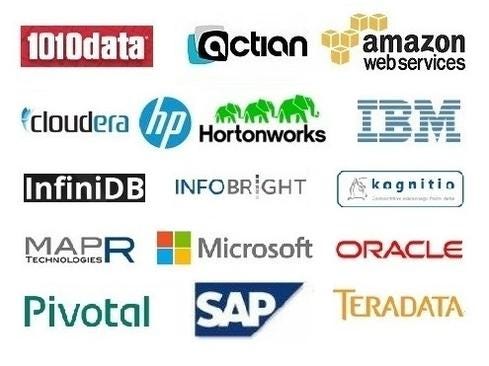Ellison’s Oracle HCM Chat Turns To Rivals, HawaiiEllison’s Oracle HCM Chat Turns To Rivals, Hawaii
Larry Ellison's Oracle human capital management keynote leads to questions about IBM, SAP, video games, and island real estate.


16 Top Big Data Analytics Platforms
16 Top Big Data Analytics Platforms (Click image for larger view and slideshow.)
After a full day of sessions at Oracle HCM World in Las Vegas and a one-hour keynote by Larry Ellison, perhaps it shouldn't be surprising that many of the HR professionals in attendance wanted to ask the celebrity CEO questions about topics other than human capital management.
Ellison was only too happy to oblige, talking about acquisitions, competitors, acquisitions, video games, and his plans for the island of Lanai in Hawaii, which he bought in 2012 for an estimated $500 million.
Of course, topic A for Ellison throughout his "Modern HCM is Social HCM" keynote was Oracle HCM, the socially enabled application suite that Oracle lately touts as its fastest-growing cloud computing offering. Ellison called HCM and customer-experience apps the most important systems at any company or government agency because they facilitate communications and manage the crucial information around people, whether they're employees or customers.
[Want more on Workday's alternative to Oracle HCM? Read Workday Brings Consumer Web Experience To Enterprise Apps.]
Recapping the high points of Oracle HCM Cloud, including its recruiting, onboarding, training, career planning, talent-review, and workforce planning functionality, Ellison said what distinguishes Oracle HCM from other HCM systems is its social underpinnings.
"If you look at the user interfaces, it looks like a social network, and that's good because most people know how to use social networks," Ellison said.
Decrying "20th century HR apps" that required "three-week training courses" and did little more than "cut checks and let you request vacation days," Ellison talked about social not only as a way to hook into LinkedIn for recruiting, but also to tap employee referrals.
"The bad news is you get a lot more candidates that you have to sift through using these social techniques," Ellison said. "That's why we have these analytics that help you identify the very best candidates that you want to start interviewing right away."
Oracle HCM's built-in analytics also spot when you're at risk of losing a key employee or when you have a manager who loses more people than he or she should, said Ellison.
"The Talent review process does constant risk analysis within the employee base down to groups and individual employees," he said.
Ellison finished his keynote in true Ellisonian style, making a litany of claims about Oracle HCM Cloud's unique characteristics. "We have the only HCM system that has an integrated social network," he said. "We're the only one that has integrated recruiting and social sourcing inside of the core HCM system. … We're the only one with integrated learning management and the only one with predictive analytics throughout the system."
There are certainly other HCM vendors with embedded social functionality, learning management tools, and analytics (Cornerstone, SAP, and Workday among them), so there must be some nuance in Ellison's interpretation of "integrated" or, perhaps, in his definition of "HCM system."
It's not that attendees didn't ask anything about HCM during the Q&A session that followed Ellison's keynote. For example, one attendee asked about the best way to handle onboarding during acquisitions given Oracle's experience with such deals. Ellison responded that the best approach is situational, depending on the company being acquired. He cited the acquisition of Sun, a giant company, as very different from acquiring a tiny startup with a few dozen employees.
The more colorful and interesting answers followed the off-topic questions. Asked about Oracle's competition, Ellison followed up on remarks he made last week at a cloud event by clarifying that SAP and IBM are still Oracle's largest competitors, but they're "not the ones we're paying all that much attention to," he said.
"As we plan to compete, we're building modern, socially enabled applications in the cloud; SAP doesn't do that. That's something that Salesforce does or Workday does," he said. "We're looking at providing our database in the cloud and our Java services in the cloud, and that's not something that IBM does; that's something that Amazon does."
Maybe Ellison's distinction here is that SAP bought, and did not build, SuccessFactors? Or that IBM offers DB2 in the cloud, but not the Java that Oracle acquired with Sun?
Asked about the promises of technology, Ellison talked up many positive benefits to society, but he lamented the hours children spend playing video games rather than riding bikes or playing with real balls.
"Kids prefer virtual games to real games because it's easier," he said. "Everybody gets to be Lebron James in virtual reality. Kids think, 'This is so cool; I'm Lebron.' No, you're not!"
Responding to a request from a man who identified himself as a new Oracle employee and a native Hawaiian, Ellison spent more than five minutes detailing his plans for experiments in green energy, smart agriculture, and improved schools and public facilities on the island of Lanai.
"There are things we're doing as far as logistics, power generation, power distribution, irrigation, desalinization that can be a model for a next generation of technology," Ellison concluded to a round of applause.
Ellison's HCM rundown may have seemed a bit 101 to HR veterans familiar with these applications, but he clearly had a firm grasp of the issues, seemed relaxed and open, and, as always, didn't fail to entertain while sharing Oracle's version of reality.
Too many companies treat digital and mobile strategies as pet projects. Here are four ideas to shake up your company. Also in the Digital Disruption issue of information: Six enduring truths about selecting enterprise software. (Free registration required.)
About the Author
You May Also Like






